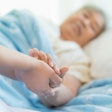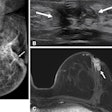
Young women with breast cancer often experience financial difficulties after diagnosis, even if they have steady jobs and insurance, according to a study published online March 4 in the American Association for Cancer Research (AACR) journal, Cancer Epidemiology, Biomarkers & Prevention.
Why? Because younger women are often in the midst of building careers and raising families, which boosts the negative impact of a cancer diagnosis, wrote a team led by Florence Tangka, PhD, of the U.S. Centers for Disease Control and Prevention (CDC) in Atlanta.
"Many women who are diagnosed with breast cancer in the early years of their careers try to maintain their jobs in order to keep their health insurance coverage, and despite having insurance coverage, they may still experience financial challenges through the course of treatment," she said in a statement released by the AACR.
For the study, Tangka's group used data from cancer registries in California, Florida, Georgia, and North Carolina to identify 830 women between the ages of 18 and 39 who were diagnosed with breast cancer between January 2013 and December 2014. The women completed a survey that included questions on insurance status, out-of-pocket costs related to cancer care, employment status and benefits, and access to treatment.
Almost half (47%) of survey respondents experienced financial hardship due to costs related to their cancer care, Tangka and colleagues found. The team also found the following:
- 27.7% of the women spent less than $500 on out-of-pocket costs, while 27.9% spent $500 to $2,000.
- 81.5% of survey respondents stated that they used personal funds to pay these costs.
- 40.4% of survey respondents stated that their job performance had been negatively affected.
- 55% of the women took paid time off during treatment, while 47.3% took unpaid time off.
"Even though patients and physicians understand the importance of having discussions about the economic burden of cancer, such conversations seldom occur," Tangka said. "Cancer patients may not have choices in all aspects of cancer care, but if they have information on the duration of treatment and how much they need to pay out of pocket, they can plan better."



















